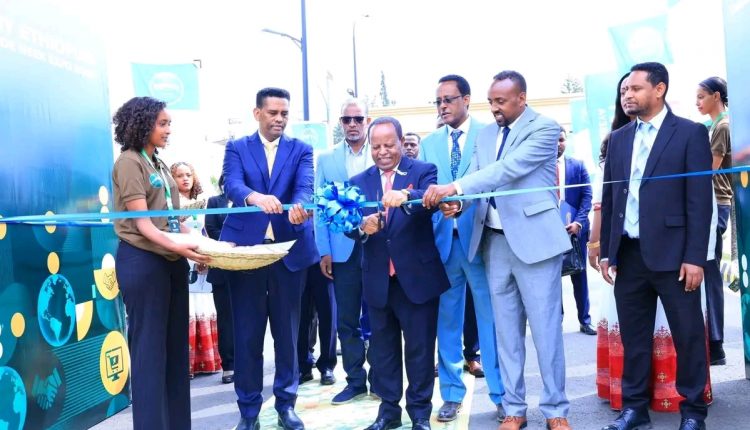“Buy Ethiopian” National Trade Week Expo 2025 Opens in Addis Ababa
Addis Ababa, August 30, 2025 (FMC) — The 2025 edition of the “Buy Ethiopian” National Trade Week Expo has officially opened at the Quality Village in Addis Ababa, showcasing locally made products and services as part of a broader effort to boost domestic industries and strengthen Ethiopia’s position in global trade.
The six-day event, organized by the Ministry of Trade and Regional Integration (MoTRI), features both an exhibition and a bazaar highlighting agricultural produce, manufactured goods, handicrafts, and emerging brands from across the country. The program also includes recognition for outstanding business performers of the 2017 Ethiopian fiscal year.
FDRE President Taye Atske-Selassie inaugurated the expo and toured the exhibition halls, where regional states and city administrations are presenting diverse Ethiopian products.
On the occasion, Minister of Trade and Regional Integration Kassahun Gofe (PhD) emphasized that Ethiopia’s growth and prosperity rest on the strength of its institutions, noting that institutional reforms are underway to make the business landscape more accessible, predictable, competitive, and fair. He said these reforms are enabling the country to fully harness its economic potential and secure its rightful place in the global market.
The Minister underlined that the Quality Village, inaugurated by Prime Minister Abiy Ahmed in November 2024, has already become a world-class trade hub, offering comprehensive quality infrastructure — from standards development and conformity assessment to accreditation services. He stressed that by implementing regional and international trade agreements, the Quality Village has created a favorable environment for both trade and investment.
Highlighting achievements from the past fiscal year, Kassahun noted that Ethiopia has modernized its trade system by shifting away from traditional practices and embracing digital platforms. Over three million services were delivered online, with business procedures streamlined from 11 criteria over 32 days to just three criteria within 7 days — with plans to reduce this further to a single-day process.
He also pointed to policy measures that expanded weekend shopping centers to 1,567 nationwide, ensuring greater access to affordable consumer goods while stabilizing supply and prices of essential commodities such as oil, cement, and salt.
According to the Minister, export trade has been one of the leading beneficiaries of Ethiopia’s domestic macroeconomic reforms, generating 8.3 billion dollars in the last fiscal year — 161 percent of the planned target. He added that Ethiopia is actively engaged in bilateral, regional, and multilateral negotiations to maximize benefits from international trade partnerships.
In this regard, he announced that implementation regulations reducing customs duties under the African Continental Free Trade Area Agreement (AfCFTA) have been enacted, a national strategy has been adopted, and Ethiopia’s first shipment under AfCFTA will be launched in the coming weeks.
The “Buy Ethiopian” initiative, he said, is not only a platform for promoting homegrown products but also an instrument of national economic transformation — strengthening competitiveness, fostering innovation, and building consumer loyalty towards Ethiopian-made goods.

